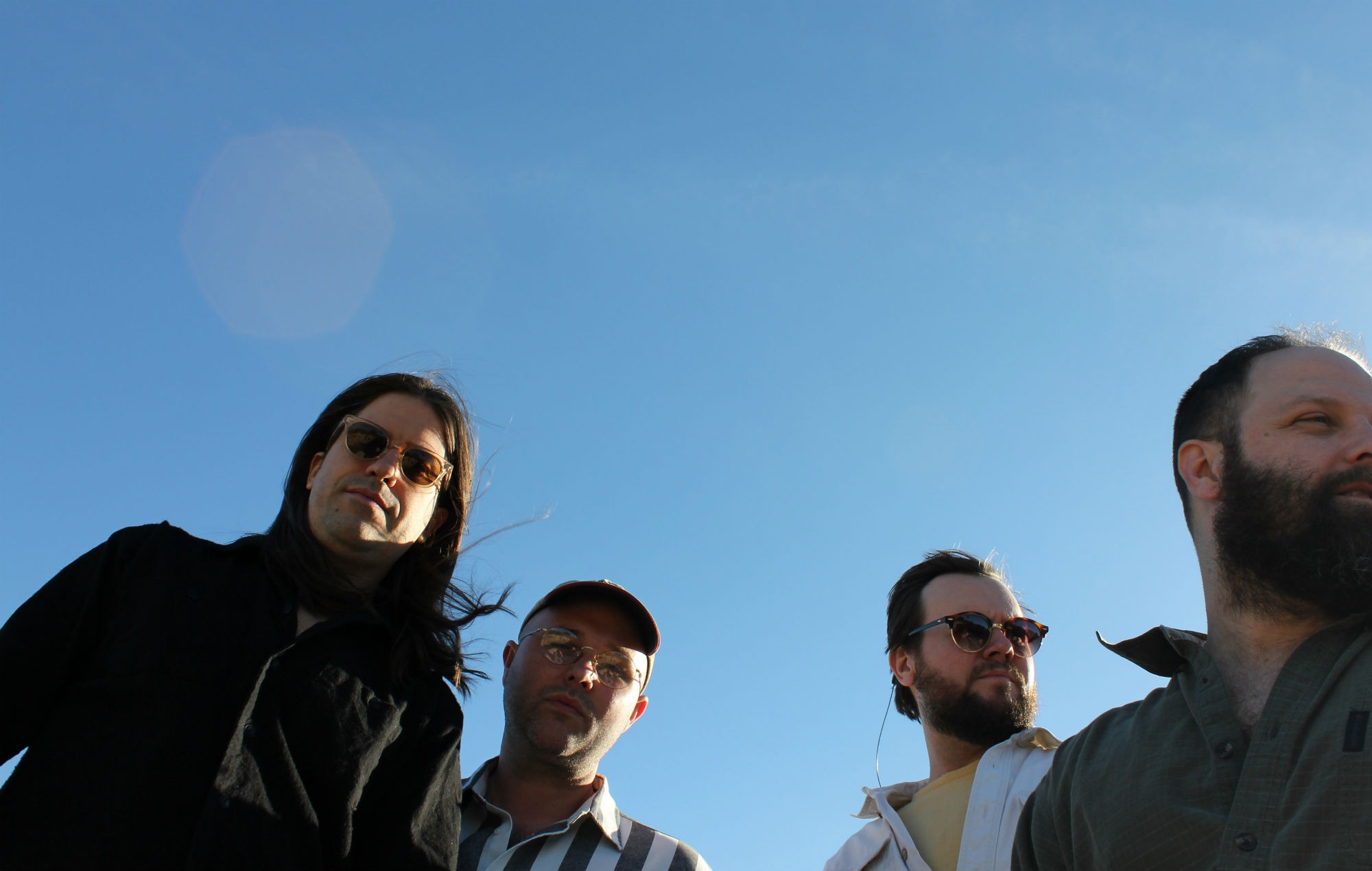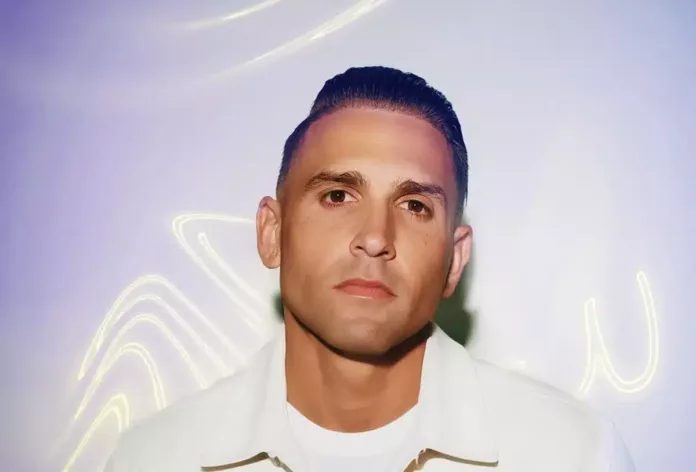
Pure X: “People are bonding all over the world as victims of oppression”
The first thing Pure X want to say about their fourth album is that it’s not important. It may well be their first in six years — a hiatus during which many of the Texas quartet’s cult following thought they may not come back at all — but given that it lands in the early summer of 2020 with the planet shrouded in chaos, it’s hard for them to call it significant at all.
“Our album is the most unimportant piece of news. It is not news right now, it means nothing,” begins singer and bass guitarist Jesse Jenkins, dialling in from home.
Singing guitarist Nate Grace, who uses they/them pronouns, echoes that sentiment, and it takes a while for their self-titled follow-up to 2014’s ‘Angel’, after which they were dropped from their label and then disappeared, to float to the front of our conversation.
Grace and Jenkins formed Pure X as a noisy, soulful, escapist project in 2009 with drummer Austin Youngblood, adding multi-instrumentalist Matty Tommy Davidson after their punchy, ecstatic debut album ‘Pleasure’ came out in 2011. They lived in a shared house in Austin, indulging in weed, tarot reading, skateboarding and cold beer. Now, more than a decade on, Grace has two children and all four members now reside separately across the US which, like much of the planet, is currently engulfed in anti-racism protests and being ravaged by coronavirus. Pure X reunited in 2017 to begin their self-titled new album, which is their clearest expression yet: a record that takes in old country, shoegaze and doo-wop and is designed to impact body and mind.
Pure X feel angry, but hope lingers — the idea that the uproar around the world has to count for something. “I feel every emotion imaginable, but also hope, finally. People are studying this shit and waking up to this fucking brutal country,” says Jenkins.
“People are bonding all over the world as victims of oppression,” Grace offers. “People are protesting for black lives, man. All the Covid stuff was enough of a challenge, dealing with fear, sickness and death. And now it’s compounded by police brutality, the literal murder of black people. It’s evil. It’s got to stop.”
Weirdly enough, Pure X have already channelled these feelings into music: their fourth record launched with ‘Middle America’, a scorched, frustrated Americana lullaby. Grace and Jenkins tell NME the whole album seeks to turn disgust, both internal and external, into hope.
“The album is about this American… tragedy, I guess,” says Grace. “It’s exactly what’s happening now.”
“I think it’s good timing for it to come out,” says Jenkins. “As far as how it affects our notoriety or sales or whatever, I couldn’t give a fuck. But, to me, a lot of the themes are confirmed.”
And so Pure X’s new record is here to hold up a mirror as the world burns. But, say Grace and Jenkins, they hope it reflects better days to come, too.
NME: It must feel strange to release an album after so long in this scenario…
Nate Grace: “Oh man, where to begin? We’ve always made albums not really caring so much what people think, or if they get big or whatever. We make albums because it’s what we’ve always done. The album is out there and the themes on it are the same things that are happening in real life: anger, wanting to tear down this fucked-up system, wanting to scream, cry, all these things. But more than any music that’s coming out, something more important is happening: this total shifting of consciousness, of people waking up.”
What role does music have at a time like this?
Jesse Jenkins: “If it connects with anybody right now, if it can help anybody deal with the crazy mindfuck that’s going on across the world, even one person, then great. It certainly helps me voice the frustrations and emotions that I have. So if it can connect with one other person on the planet, then great. We leave it there for people to find. They don’t find it fast and they don’t find it all at once, they find it gradually when they need it.”
How was it recording together after so long apart?
JJ: “Being apart for so long and not being able to work on it every day made it more fun. We’d have to plan months in advance, so by the time we got together it was like a party. We were really excited to see each other and show each other songs. There was good energy every time and that’s captured pretty well [on record].”
NG: “We had very specific intentions: we wanted it to sound live, raw and cohesive. We made demos for all the songs first, rehearsed them and then went into the studio for six days and just knocked it out of the park. There was a lot of intentionality, knowing what we wanted and exactly what we wanted it to sound like. Thank goodness we were able to do that, it’s no easy task.”

Six days is pretty fast, isn’t it?
JJ: “For our previous records there’s been a lot more turmoil: we were around each other 24/7, touring, living together. There was more frustration, more staleness, maybe. We just wanted to forget all of that. Also, we’re just better at making records now, we know what to do and how to do it.”
NG: “Recording is all about catching the vibe. That’s a tough thing to do. You can have the best song in the world, but if you don’t get in the studio and catch the vibe of that song, catch the life of it, then it’s gonna sound like shit. It has to be a living recording, a moving thing, so when people hear they feel the emotions, feel the guitars.”
What impact do you want your music to have on people: is it still about ecstasy and escape?
JJ: “It’s about getting the point across in the most direct way possible. I would describe Pure X as a soul band more than anything else. That’s my biggest musical influence, but also the attitude and the way of just putting it to the audience as plainly as you possibly can, making sure every aspect of the recording, every instrument, every note, every word is moving in the same direction.”
NG: “When I think of music I want to listen to, there’s something so powerful about it — it’s not just pop songs to dance to. I think of ‘Mother’ by John Lennon, it’s just raw as fuck; it’s straight to the point. When a person hears that song they feel it. You cannot listen to that song without crying or something, you feel it in your heart immediately. That’s what I love about music; it has that power to transform people’s emotional state instantaneously with vibrations. Ideally, that’s the kind of music I’d like to create.”
Can you describe the feeling of playing in Pure X?
JJ: “It’s never easy. You always have to dig way down deep inside yourself to get something good. As a band, you have to do it all at the same time, everybody has to understand what we’re digging for. I love that we’re a band in the true sense of the word: we come together and we make a thing that nobody else can make.”
NG: “It’s one cohesive thing. Especially when we’re playing live and we’re on it, man, there is no band comparable in my opinion. When we’re killing it, it’s really powerful. I’ve seen it in some rooms where we’ve played: one dude told me we put him in a trance so much that he passed out — his friend had to catch him falling to the floor.”
JJ: “I barely open my eyes when we play. At one show, I opened my eyes once and every single person in the audience was kissing another person.”
What does it mean to you to be in Pure X now?
JJ: “The connection is real, it’s really deep and very real. We’ve known that since day one. We’re really good at making the time, taking care of each other, inspiring each other, protecting that special connection we have. It’s a very special part of my life that I know I can always count on.”
NG: “I remember the first day I met Jessie was 2002 or 2003, the first time I heard him play it was like: ‘Woah, this motherfucker is amazing!’ That was it. We have some deep spiritual connection that I don’t understand. But when we get together, it’s just there. When we first started, I was really attached to making a living with music, so the band was a vehicle for these dreams. Then over time, it became about being disillusioned with the music industry, never being able to pay rent. Now, I don’t have any attachment to fame or fortune, the band has been boiled down to its true elements, and that is us as people getting together and playing music, having fun and expressing ourselves and growing together.”



